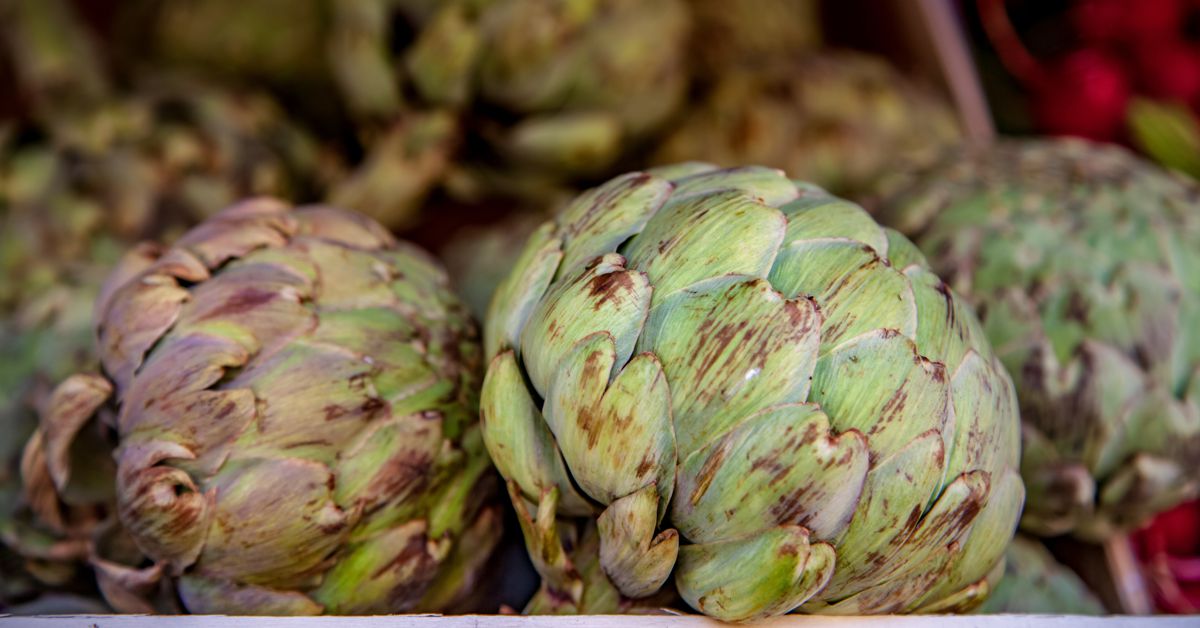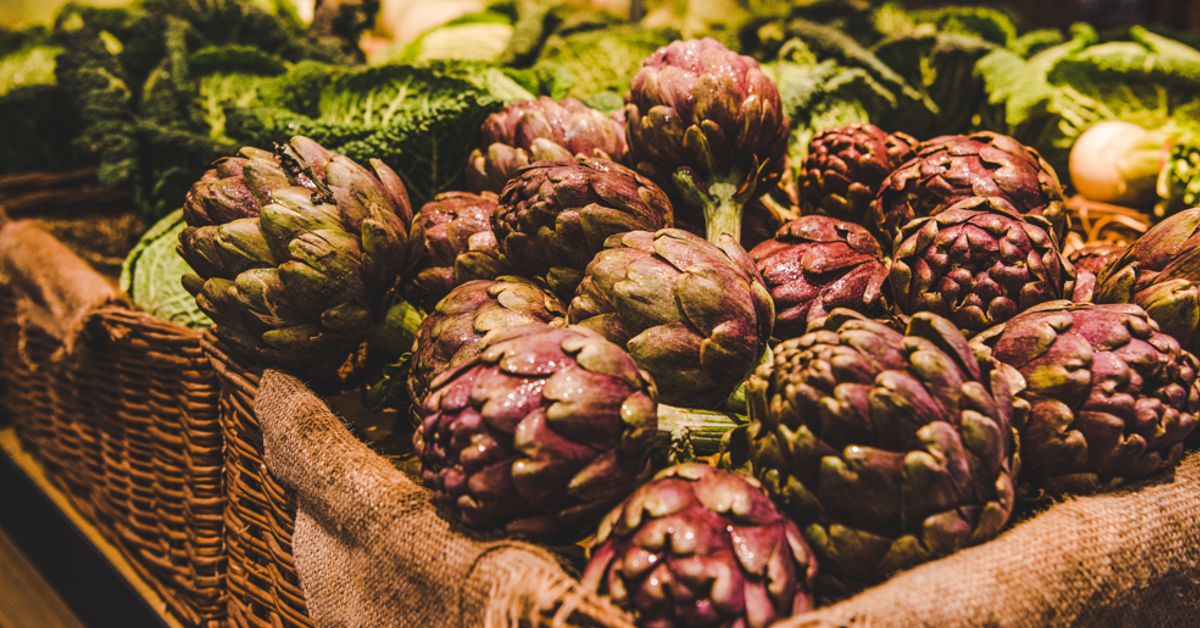Artichokes are a type of vegetable that belong to the thistle family.
They are native to the Mediterranean region and have been cultivated for centuries for their unique and flavorful edible flower heads.
They are characterized by their large, spiky leaves and are typically green in color, although some varieties may have a purplish or reddish hue.
This vegetable is a versatile vegetable that can be eaten in a variety of ways, both raw and cooked.
The edible portion is the flower head, which is located at the top of the plant.
The base of the flower head is called the heart, which is considered the most flavorful and tender part of the artichoke.
The heart is surrounded by layers of edible leaves, which become more tender as you work your way towards the center.
Different Artichokes
There are several different varieties of this vegetable available, with the most common being the globe artichoke.
Globe artichokes are the largest variety, with a round or oval shape and a thick stem.
They are typically the variety that is sold in supermarkets and are the type most commonly used in recipes.
Other varieties include the French or baby artichoke, which is smaller and more tender than the globe variety, and the Jerusalem artichoke, which is actually a type of tuber and is not related to the artichoke plant.
This vegetable can be enjoyed in a variety of dishes, both cooked and raw.
They can be steamed, boiled, roasted, grilled, or fried, and can be used in a variety of dishes, including soups, stews, pasta dishes, and more.
They can also be eaten raw, either as a snack or as part of a salad.
When eating it raw, it is important to remove the leaves and scrape off the inedible portion at the base of each leaf with your teeth to reach the tender heart.
Benefits and nutrients of the Artichokes
One of the main benefits is their high fiber content.
A single artichoke contains about 10 grams of fiber, which is about one-third of the recommended daily intake for adults.
This high fiber content can help to support healthy digestion, prevent constipation, and may even lower cholesterol levels.
In addition to fiber, artichokes are also a good source of several important nutrients. These include vitamin C, vitamin K, folate, and manganese.
They also contain antioxidants, which can help to protect against free radical damage and reduce the risk of certain chronic diseases.
Recipes with Artichockes
Breakfast
Artichoke and spinach frittata: This frittata is made with beaten eggs, diced artichokes, and chopped spinach, and is perfect for a savory breakfast or brunch.
Goat cheese omelet with Artichokes: This omelet is filled with diced artichokes, crumbled goat cheese, and herbs for a flavorful and satisfying breakfast.
Artichoke and feta breakfast burritos: These burritos are made with scrambled eggs, diced artichokes, crumbled feta cheese, and your choice of vegetables, wrapped in a warm tortilla.
Tomato and Artichoke breakfast bake: This bake is made with diced artichokes, cherry tomatoes, and eggs, and is baked until the eggs are set and the vegetables are tender.
Artichoke and mushroom quiche: This quiche is made with a crust filled with diced artichokes, sliced mushrooms, and a creamy egg mixture.
Lunch
Chicken salad with Artichoke: This salad is made with diced artichokes, shredded chicken, and your choice of vegetables, served over a bed of greens.
Artichoke and white bean hummus: This hummus is made with mashed white beans, diced artichokes, and spices, and is perfect for spreading on sandwiches or dipping vegetables.
Goat cheese sandwiches with Artichokes: These sandwiches are made with sliced artichokes, crumbled goat cheese, and your choice of vegetables, served on your choice of bread.
Artichoke and pesto pasta: This pasta is made with cooked pasta, diced artichokes, and a homemade pesto sauce.
Tomato soup with Artichokes: This soup is made with diced artichokes, chopped tomatoes, and spices, and is perfect for a hearty and satisfying lunch.

Dinner
Artichoke and shrimp scampi: This scampi is made with sautéed shrimp, diced artichokes, and a buttery garlic sauce, served over pasta or rice.
Chicken parmesan with Artichoke: This parmesan is made with breaded and fried chicken breasts, topped with diced artichokes and a tomato sauce, and baked until the chicken is cooked through.
Artichoke and goat cheese stuffed chicken: This chicken is stuffed with a mixture of diced artichokes and crumbled goat cheese, then baked until the chicken is cooked through and the cheese is melted.
Mushroom risotto Artichoke: This risotto is made with Arborio rice, diced artichokes, sliced mushrooms, and a creamy broth, and is simmered until the rice is tender.
Artichoke and lemon pasta: This pasta is made with cooked pasta, diced artichokes, and a lemon butter sauce, and is garnished with fresh herbs and Parmesan cheese.
Extra benefits of Artichokes
This vegetable has been shown to have a positive effect on blood pressure, which is an important factor in the development of heart disease.
A study published in the American Journal of Clinical Nutrition found that consuming artichokes regularly helped to lower both systolic and diastolic blood pressure in adults with high blood pressure.
In addition to their potential effects on blood pressure, artichokes may also have Inflammation is a bodily response to damage or illness that is usually the result of a healthy immune system.
Nevertheless, persistent inflammation has been linked to various ongoing illnesses such as cardiovascular disease, cancer, and diabetes.
Artichokes contain antioxidants, such as silymarin and cynarin, which may help to reduce inflammation in the body.
Artichokes are also low in calories and fat, making them a healthy choice for those looking to maintain a healthy weight.
One medium artichoke contains only 60 calories and is a good source of fiber, which can help to keep you feeling full and satisfied.
They are also a good source of protein, making them a good choice for vegetarians or those looking to incorporate more plant-based proteins into their diet.
In conclusion, artichokes are a delicious and nutritious vegetable that can be enjoyed in a variety of dishes for breakfast, lunch, and dinner.
They are high in fiber, nutrients, and antioxidants, and have a number of health benefits, including supporting healthy digestion, reducing the risk of heart disease, and possibly having anti-inflammatory properties.
Whether you enjoy them in a frittata for breakfast, a hummus for lunch, or a pasta for dinner, artichokes are a tasty and healthy addition to any meal.
Thanks for reading
Thanks for reading! If you found the information in this article helpful, please save our site in your bookmarks and share it.
Also, be sure to check out our Nutrition section here on Woman Vitality for more articles just like this one.

Leave A Comment